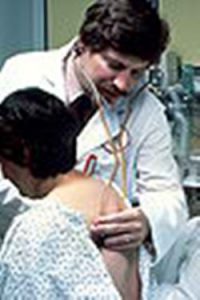Eating Disorder Examination
 The Eating Disorder Examination is a tool that can be used by a qualified clinician that can help in the diagnosis of an eating disorder.
The Eating Disorder Examination is a tool that can be used by a qualified clinician that can help in the diagnosis of an eating disorder.
The Eating Disorder Examination is a series of questions administered by a board certified psychiatrist, licensed doctorate-level psychologist, mental health resident, or a doctorate-level mental health professional, under close supervision of a board certified psychiatrist or licensed doctorate-level psychologist.
The Eating Disorder Examination assesses the frequency of disordered eating behaviors over the past 28 days. The questions are organized into four groupings: restraint, eating concern, shape concern, and weight concern.
Four groupings of the EDE
The portion of the Eating Disorder Examination concerned with restraint asks questions about restraint over eating, avoiding specific foods, dietary rules, avoidance of eating, and emptiness felt in the stomach.
The eating concern portion of the Eating Disorder Examination asks about preoccupation with food, fear of losing control over eating, eating in secret, social eating, and guilt after eating.
The shape concern portion of the Eating Disorder Examination asks about body concerns including specifically a flat stomach, preoccupation with body shape or weight, the importance of shape, fear of weight gain, dissatisfication with body shape, discomfort in seeing the body, avoidance of exposure of the body, and feelings of fatness.
The weight concern portion of the Eating Disorder Examination investigates the importance of weight to the patient, any reactions to prescribed weighing, preoccupation with body shape and weight, dissatisfaction with current weight, and a desire to lose weight.
The Eating Disorder Examination tool is extensive and may be part of a larger medical examination for determining if a patient has an eating disorder. The full medical examination for an eating disorder may also include a medical history, a physical exam, and various clinical or diagnostic tests.
The information from Eating Disorder Examination has been converted into a questionnaire for self-reporting of eating disorder symptoms. This shorter format is a separate tool used in the diagnosis and treatment of eating disorders and is called the Eating Disorder Examination Questionnaire.
 Eating Disorder Self Test. Take the EAT-26 self test to see if you might have eating disorder symptoms that might require professional evaluation. All answers are confidential.
Eating Disorder Self Test. Take the EAT-26 self test to see if you might have eating disorder symptoms that might require professional evaluation. All answers are confidential.